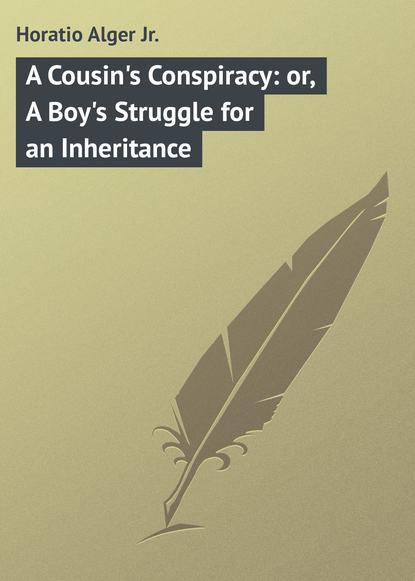По всем вопросам обращайтесь на: info@litportal.ru
(©) 2003-2024.
✖
A Cousin's Conspiracy: or, A Boy's Struggle for an Inheritance
Настройки чтения
Размер шрифта
Высота строк
Поля
It occurred to him that there might be hoards hidden under the floor, or in the immediate neighborhood of the cabin. But it was night, and there would be no profit in pursuing the search now.
“To-morrow,” he reflected, “the boy will be off, making preparations for buryin’ the old man, and then I can make another visit.”
He closed the lid of the trunk, and with a general glance to see if there was anything more worth taking he rose to his feet and prepared to leave the room.
Just at this moment Ernest, who was probably dreaming of the old man, spoke in his sleep.
“Uncle Peter,” he murmured.
The tramp stood still, apprehensive that Ernest would open his eyes and detect his presence. But the boy did not speak again.
“I had better get,” muttered Burns.
He got out of the window quietly, but as the boy stirred again he hurried away without stopping to shut it.
When, a little after seven o’clock, Ernest woke up, the sun was streaming in at the open window, and the cool air entered with it.
“How came the window up?” thought Ernest, wondering. “I am sure I didn’t leave it open last night.”
There was nothing else to indicate that the cabin had been entered. But the more Ernest thought it over the more convinced he was that there had been a visitor.
What could have been his motive?
With sudden suspicion he went to the trunk and opened it. It was evident that things had been disturbed. His eyes sought the box that contained the gold pieces. He opened it, and found that he had been robbed.
“Who could have done it?” he asked himself.
He could not think of anyone. He was acquainted with everyone in the village, and he knew none that would be capable of theft. He never thought of the ill-looking tramp he had met in Joe Marks’s store.
Ten dollars was a considerable loss to him, for he had estimated that it would defray the expenses of old Peter’s interment. It was not so bad as it might have been, for the hundred dollars of which Peter had told him were still safe.
“When I get that I must be careful,” he said to himself.
Though his rest had been disturbed, he felt ready to get up. There was work for him to do. He must arrange for the burial of the old man with whom he had lived so long, the only friend he felt he could claim.
Ernest rose, and after dressing himself made a frugal breakfast. He looked sadly at Peter. Death was to him something new and strange, for he did not remember ever having seen a dead man before. He must get help, and with that object in view he went to the village, and sought the store of Joe Marks.
“What brings you out so early, my lad?” asked Joe.
“Matter enough, Joe. My uncle is dead.”
He still called him uncle, though he knew now that Peter was no kin to him.
“Old Peter dead!” ejaculated Marks. “When did he die?”
“Some time during the night. I wish you’d help me, for I don’t know what to do.”
“So I will, boy. We’ll stand by you, won’t we, Luke?”
This was said as Luke Robbins entered the store.
“To be sure we will, Ernest. We all like you.”
“Oh, I forgot to say,” continued Ernest, “the cabin was entered last night and some money taken.”
CHAPTER IV
ALONE IN THE WORLD
Joe Marks and Luke Robbins looked at each other in amazement.
“Your cabin entered!” exclaimed Joe. “What do you say to that, Luke?”
“I did not know there were any thieves round here,” answered Luke. “What was taken?”
“An old trunk was opened – I carelessly left it unlocked – and two five-dollar gold pieces were stolen out of it. At any rate, I couldn’t find them this morning.”
“Two five-dollar gold pieces?” said Joe quickly. “Then I know who took them.”
“What do you mean, Joe?” said Luke. “Out with it!”
“You know that tramp who was here yesterday, Luke?”
“Yes.”
“He came round an hour ago, and called for a glass of whisky. ‘Where is your money?’ I asked. ‘I’ve got plenty,’ he said. Then I called upon him to show it, and he pulled out a five-dollar gold piece. Of course I was surprised. ‘Where did you get it?’ I asked suspiciously. ‘Yesterday you said you had no money.’ ‘I had that,’ he answered, ‘but I didn’t want to spend it. You see it was a gift from my dyin’ mother, and I wanted to keep it for her sake.’ With that he rolled up his eyes and looked sanctimonious. Then I asked him how it happened that he was ready to spend it now.”
“What did he say?”
“He said that he was so parched with thirst that he felt obliged to do it.”
“Did you take his money?”
“No. I was short of change. You see I changed a gold piece for the boy yesterday. Besides, I wasn’t sure the piece was good, seeing who offered it.”
“Then he didn’t get his whisky?”
“No. He went away disappointed. I don’t doubt, Ernest, that the gold piece was one of yours. How did the fellow get in?”
“Through the window. I found it open when I woke up.”
“You must have slept sound.”
“I did. I slept an hour later than I generally do.”
“Was anything else taken?”
“Not that I could discover.”











